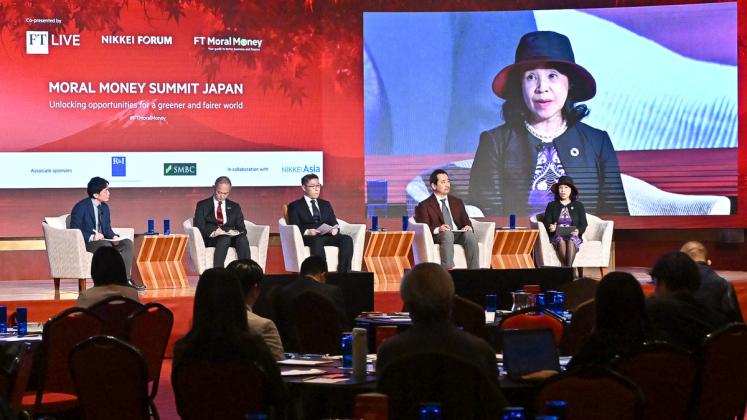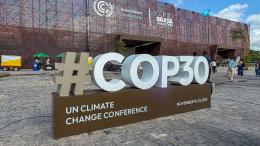On 8 February 2024, Shinobu Yume Yamaguchi (Director, UNU-IAS) spoke as a panelist in a session on building climate resilience to reduce Japan's disaster risks. The session was part of the high-level conference Moral Money Summit Japan: Unlocking Opportunities for a Greener and Fairer World. The event convened business and government leaders, policymakers and investors to discuss sustainability issues in Japan. It was organized by Financial Times Live, the global events division of the Financial Times, and co-hosted by Nikkei Inc.
Moderated by Yuta Koga (ESG Editor, Nikkei Inc.), the session featured Takaharu Fukuda (Senior Executive Officer, Kajima) and Takayuki Kumada (President and CEO, Blue Innovation) who shared insights on building climate and disaster risk resilience. Sadayoshi Tobai (CEO, WWF Japan) and Prof. Yamaguchi spoke from the viewpoints of civil society and an international organization, respectively.
Sharing her perspective on the gender-related impacts of climate change and disasters, Prof. Yamaguchi stressed that a just transition to net zero and leaving no one behind were essential to achieving the SDGs. Drawing on research by the International Labour Organization (ILO), she noted that an estimated 140 million people would need to be reskilled to implement climate change mitigation measures in the Asia-Pacific region by 2030.
Prof. Yamaguchi introduced UNU-IAS research on climate change induced displacement and highlighted the critical challenge of ensuring education for such populations. With Asia and the Pacific accounting for 80% of the world’s climate-related displacement from 2008 to 2020, she emphasized the need to pay particular attention to this region. Sharing the findings of the Think7 Issue Paper: Integrated Approach for Well-being, Environmental Sustainability, and Just Transition, Prof. Yamaguchi explained that women's participation in climate action was still at a developmental stage — 2018 data shows that in many OECD countries the percentage of women in the energy sector was as low as 20%. Referring to a survey conducted by Ernst & Young, she highlighted that utility companies which employ more women in senior positions tended to be more proactive in introducing renewable energy.
Prof. Yamaguchi concluded that when discussing climate change, we tend to focus on SDG13 (climate action), SDG14 (life below water) and SDG15 (life on land), but transition to a just society requires a holistic approach and close attention to all the SDGs.




